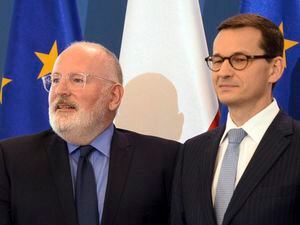No headway in EU hearing on Poland’s justice policies
The European Commission launched a rule of law procedure against the Polish government

Poland faced questions from its European Union partners on Tuesday over an overhaul of its judicial system that is seen as a violation of Western democratic standards.
In an unprecedented move, the EU’s European Commission launched a rule of law procedure against the Polish government over an alleged erosion of judicial independence in the country.
Technically, the procedure could result in Poland losing its EU voting rights, though that is unlikely.
The hearing on Tuesday was a step in the process, but did not seem to deliver meaningful progress.
Frans Timmermans, the commission’s first vice president, said the participants did not get an indication the Polish government would accept more of the commission’s recommendations for compliance.
“We need to solve this issue in a European way, through dialogue. It is essential for the common future,” Timmermans said.
Poland’s deputy foreign minister, Konrad Szymanski, answered questions during the hearing.
He said afterwards it was not clear what the next steps would be in a dispute that had all concerned in “unknown land”.
Critics of the Polish government and the judicial overhaul protested in front of the EU’s Warsaw office while the hearing was under way in Brussels.

The party says it is trying to reform a corrupt justice system that it claims is overseen by an unaccountable clique of judges.
The changes include giving the executive and legislative branches greater control over the judiciary, which opponents say could weaken the democratic system of checks and balances.
Speaking in Warsaw, Polish Prime Minister Mateusz Morawiecki said he “deplored” the fact that the EU’s so-called Article 7 procedure was not closed after Poland showed “good will and readiness for compromise” by making some amendments to its judicial laws this year at the urging of the European Commission.
Morawiecki also defended the new judicial laws, saying they were needed to reform a branch of government power that was never properly democratised after communism ended in Poland.
“Our partners don’t understand what the post-communist reality looks like,” Morawiecki told a news conference. “The justice system had a problem with self-cleansing.”





